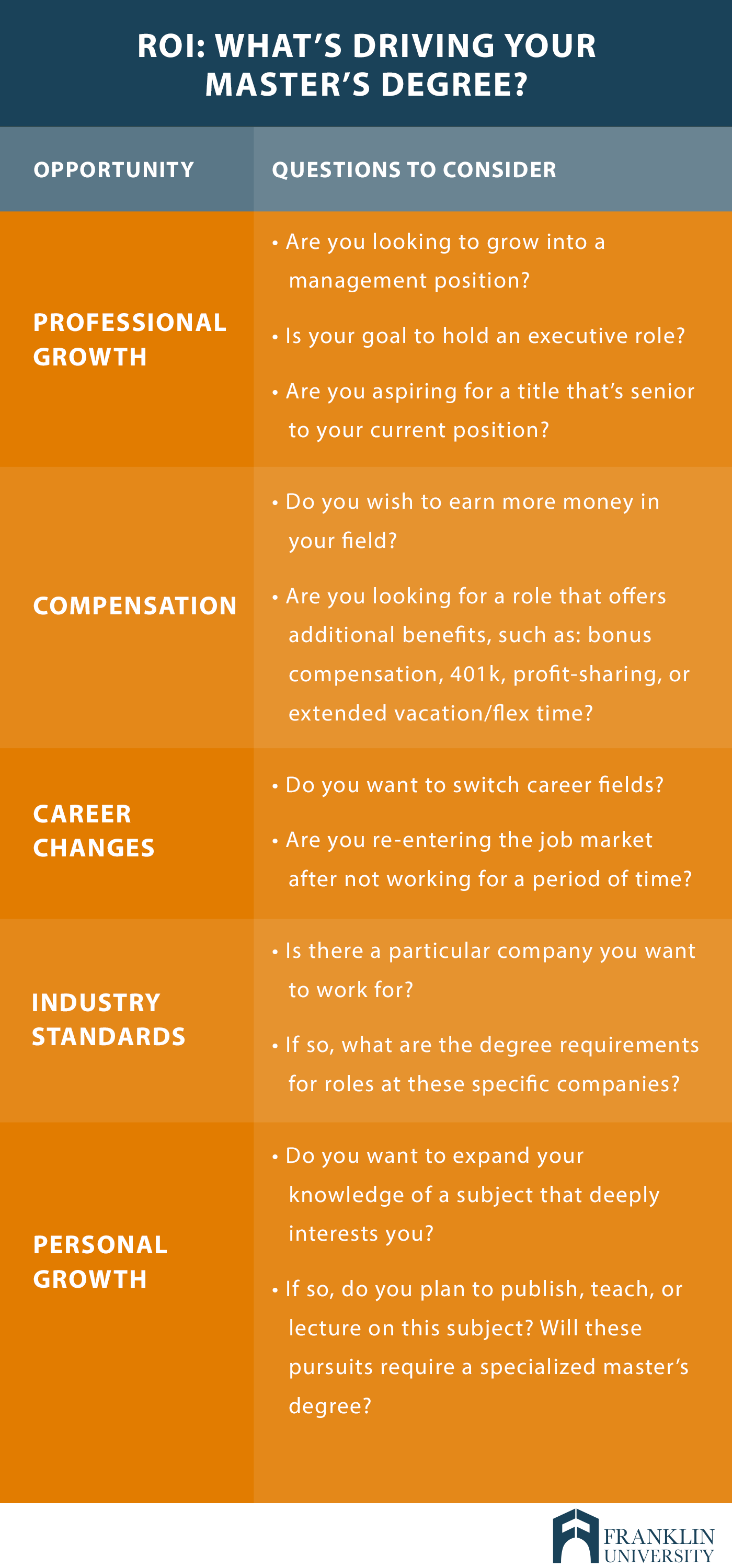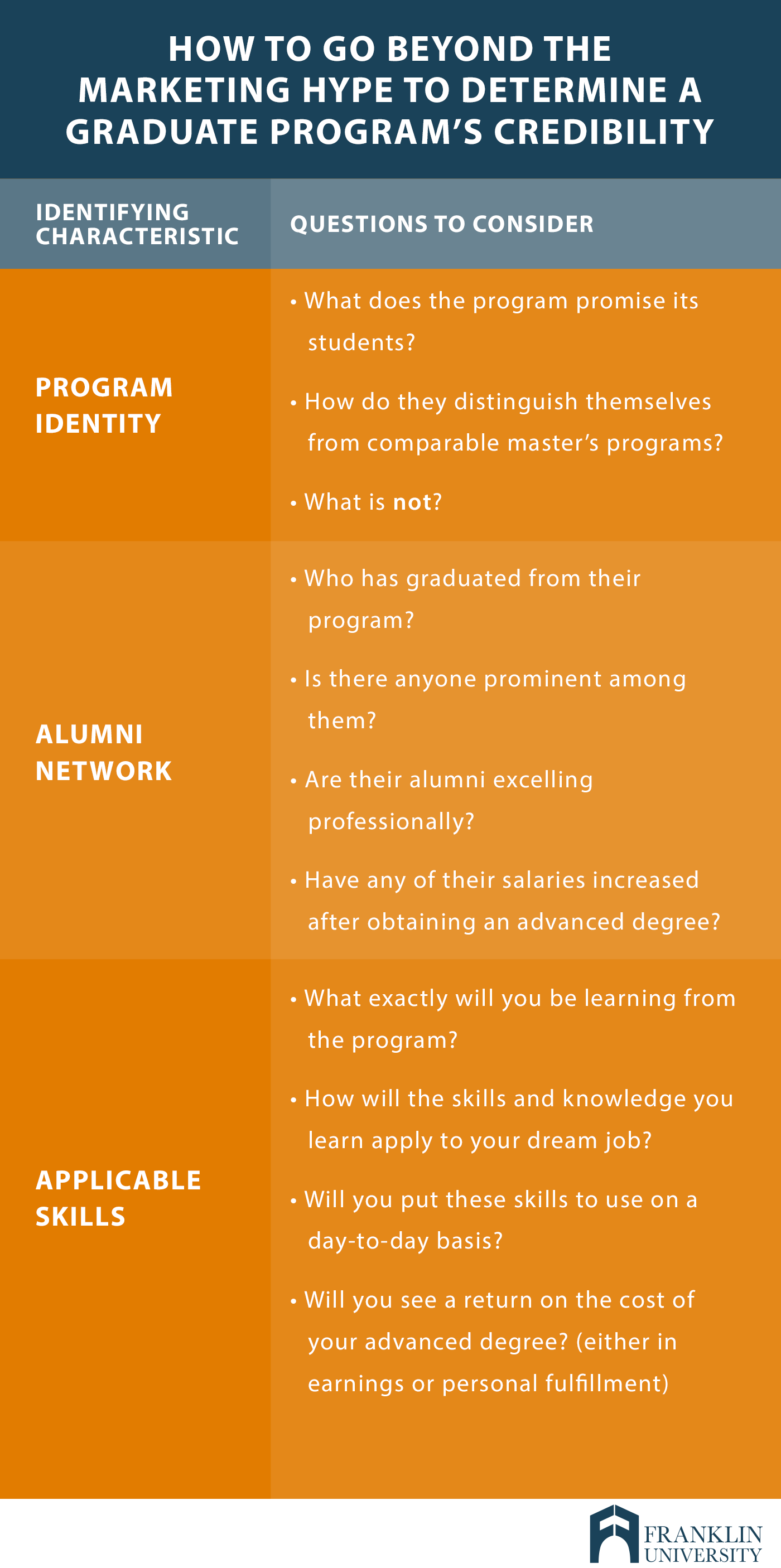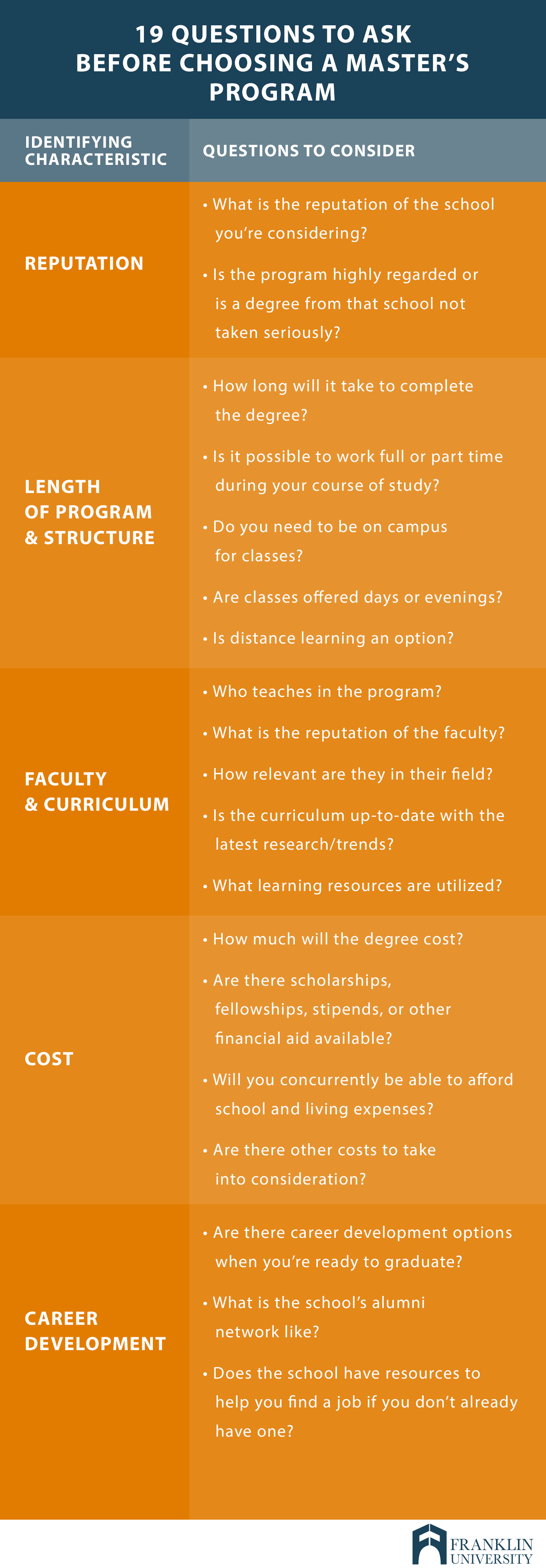Request Information
We're Sorry
There was an unexpected error with the form (your web browser was unable to retrieve some required data from our servers). This kind of error may occur if you have temporarily lost your internet connection. If you're able to verify that your internet connection is stable and the error persists, the Franklin University Help Desk is available to assist you at helpdesk@franklin.edu, 614.947.6682 (local), or 1.866.435.7006 (toll free).
Just a moment while we process your submission.

Best Master's Degrees: 5 Steps To Find The Right Program
If you are considering a master’s degree, it can feel as though there are an overwhelming amount of options out there. It’s not an easy choice to make. But don’t stress, we’re here to help.
The right degree for you may not directly correlate to your goal or your field. Some degrees are obtained through research, while others require coursework. There’s a wide array of master’s degrees to choose from, including a master of science, a master business administration, and master of healthcare administration. Complicating things even further, some degrees are often named differently depending on where you look.
So how do you select the master’s degree that’s best for you? In order to narrow down your options to the perfect fit for your goals (and your future), we’ve compiled a list some questions to consider.
What matters most when choosing a master’s program? Compare features, benefits and cost to find the right school for you.
Step 1: Determine the Why Behind Your Degree
What are your career goals? What are your personal goals? These two questions are probably the most important to think about. Many people often pursue a master’s degree because they have defined goals in place. Do you have a specific set of goals? If so, what are they?
- Get growing. A master’s degree can unlock more career opportunities, including higher pay and a better office. Do you want to grow into a management position at work? An executive position? Or is it a position that’s senior to what you’re already doing?
- Let’s talk compensation. Do you wish to earn more money in your field? Some degrees will help advance your salary faster or higher than others. A 2015 study by Georgetown University noted that college graduates with a bachelor’s degree earn an average annual salary of $61,000 over the course of their career, while those with a graduate degree earn $78,000 annually.
- Time for a 180. Do you want to switch career fields? Or are you looking to re-enter the job market after not working for a period of time?
- More than the minimum. Perhaps you’ve realized that many of the accounting jobs you would like to apply for require more than a bachelor of science degree, which wasn’t the case when you were first mapping out your career. Is there a particular company you want to work for? If so, it will be beneficial to focus your MS in accounting degree to the specialty you’re interested in.
- For the love of learning. Of course, advancing in your already established career might not be your motivation for obtaining a master’s degree. Maybe you have intellectual pursuits. Graduate courses are much more focused and can allow you to expand your knowledge of a subject that deeply interests you. You may even wish to gain recognition as a leader in a particular academic field, publish journal articles or a book, or teach.
For example, if you’re considering a master’s degree in fine art, assess your end game. A master of art, or MA, in photography can provide you with additional technical skills, but it’s not a terminal degree. So, if you want to teach, you’ll need to obtain a master of fine arts, or MFA.

Step 2: Determine the What in Your Degree
Before you rush off to research degree programs at different schools, you must first think about everything it’s going to take to make your dreams a reality. Maybe you’ve been laid off or downsized and want to get back into the job market or you’re eyeing a C-suite position within your company. You’ll likely need a new skill (or two).
Ask a few questions to help narrow your focus:
- Are there specialized skills that I need to develop in order to achieve my career goals or personal goals?
- Do I need to learn additional theories or methodologies to advance my understanding of a topic?
- Will the program offer any opportunities to gain real-world experience in the field?
- What are the emerging challenges that my industry is facing?
Look at descriptions of the job or jobs you would like. Do all of the required skills listed fall into your wheelhouse? What’s missing? Can a master’s degree help you fill in those blanks?
Step 3: See What Programs and Universities Best Meet Your Needs
Once you’ve identified the specific skills you need, you should establish what schools offer programs to help you acquire those skills. Finding the perfect fit means doing some research.
Begin by researching institutions that align with your needs. Explore programs that match your career path. For example, if you’re a working adult juggling numerous responsibilities, consider programs offered by non-traditional adult-focused institutions. Programs that are designed around the needs of busy adults can be especially beneficial.
Also be sure to examine your specialty or focus in great detail. For example, if you want to get a master of fine arts in English, check out where great writers are getting their degrees. Maybe someone who works at a creative agency or a publishing house has a tip or two that might help.
If you’re already in the workforce, consider the people in your professional network: your mentor, the person who has your dream job, or notable individuals in your industry. Where did they go to school? What was their experience like in the program they chose?
Step 4: Compile a Shortlist of Potential Schools and Programs
At this point—if you’ve followed our advice above—you should have compiled a list of master’s degree programs.
- What specific outcomes will the program help you achieve? It’s important to take note of what each institution is promising. What are they saying—in print, online, and in person? Schools should be able to articulate what their programs offer and the outcomes they can provide. Programs should also be forthright with what they aren’t, just as much as what they are. Be leery of an institution that promises to be all things to all students. A one-size-fits-all program isn’t usually a reality. Good programs will be specific, specialized, and unabashed to say so.
- Who’s who in the alumni network? Always look at a program’s graduate pool. Who are they? Is there anyone prominent among them? How are they fairing professionally? Did their salary increase after obtaining their advanced degree? Some may be doing better than others.Try looking at a school’s LinkedIn page to get the scoop on their alumni.
- What skills will I have at the end of this program, and how will those skills apply to my current job/ideal job? What exactly will you be learning from the program? How will the skills and knowledge you learn apply to your dream job as a librarian, forensic accountant, or executive vice president? Will you put these skills to use on a day-to-day basis or will all that tuition money go to waste?

Step 5: Find the Best Master’s Degree Program in Your Shortlist of Options
By now, you’ve hopefully been able to generate a list of master’s programs and narrow down your choices to a few schools. If your choices share some vast differences, here are some questions to help you compare the remaining schools to find your best fit.
- Word on the street. What is the reputation of this school within the particular industry you’re targeting? Is the institution non-profit and highly regarded?
- Time is money.How long will it take to complete the degree? How many months? Years? Will you be able to fit the workload into your busy schedule? Do you need to be on-site for classes? Are those classes during the day or at night? Can you take classes online at home or anywhere?
- Professional professors. Who’s teaching you? What’s the reputation of the faculty? Do any of the professors currently (or previously) work in the field you’re in or trying to get into? Is the curriculum up-to-date with all the latest research? From textbooks to interactive video lectures—what learning resources are being utilized?
- The price tag.How much will the degree cost you? Are there scholarships, stipends, or other financial aid available? Are there any fellowship opportunities? If you must live near the school, is the neighborhood expensive? Will you concurrently be able to afford school and living expenses in a costly location? Are there other costs to take into consideration?
- Keeping in touch. Are there career development options when you’re ready to graduate? What is the school’s alumni network like? Does the school have resources to help you find a job if you don’t already have one?

Pick the Right Master’s Degree with Confidence
Deciding what to do with your life is a tough decision to make, but it’s not one you should be afraid of.
If you choose to pursue a master’s degree, it is important to always ask questions during the decision-making process. Ask yourself. Ask admissions representatives. Ask professors and students. Ask professionals in the field. Make notes and weigh the pros and cons in a holistic way.
This will help you better determine what master’s degree will best support your career and personal goals.





